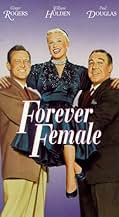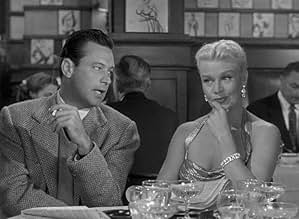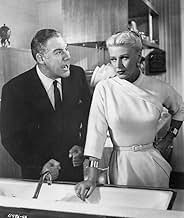An aging actress refuses to admit she is too old to play the ingénue role anymore.An aging actress refuses to admit she is too old to play the ingénue role anymore.An aging actress refuses to admit she is too old to play the ingénue role anymore.
- Director
- Writers
- Stars
- Awards
- 1 win total
Marion Ross
- Patty
- (as Marian Ross)
Brandon Beach
- Diner at Sardi's
- (uncredited)
Paul Bradley
- Actor in Play
- (uncredited)
James Carlisle
- Diner at Sardi's
- (uncredited)
Steve Carruthers
- Theatre Patron
- (uncredited)
Oliver Cross
- Club Patron
- (uncredited)
- Director
- Writers
- All cast & crew
- Production, box office & more at IMDbPro
Featured reviews
An aging stage star tries to hold on to ingénue roles. The screenplay is by the Epstein twins (Casablanca) based on a play by Barrie (Peter Pan). Given such pedigree, this comedy falls short of expectations but it is fairly enjoyable and has witty dialog. It's helped by good acting from Rogers as the actress in denial about her advancing years, Douglas as her supportive ex-husband, and Holden (on the verge of super-stardom) as a writer. A screen shot at the end of the film touts Crowley as a future star at Paramount. She never became a star, but she went on to have a long TV career, and she is winning here as a perky young actress.
A young and cynical writer (William Holden) criticises a stage star who is advancing in years but still popular (Ginger Rogers). In time he begins a relationship with her after he sells his own play to her ex-husband (Paul Douglas). A younger and upcoming actress (Pat Crowley) is also attracted to him and believes a part given to the older actress would be better suited to her.
Based off the play 'Rosalind' by JM Barrie and adapted for the screen by Julius J. and Philip G. Epstein, this film seems to have pretensions at being like ALL ABOUT EVE (1950), but this film it ain't. As a romantic comedy it's okay, but is unlikely to set the world on fire, despite the strengths of the two leads and a good performance by Douglas as the still cuckold ex who gets some of the best dialogue
Based off the play 'Rosalind' by JM Barrie and adapted for the screen by Julius J. and Philip G. Epstein, this film seems to have pretensions at being like ALL ABOUT EVE (1950), but this film it ain't. As a romantic comedy it's okay, but is unlikely to set the world on fire, despite the strengths of the two leads and a good performance by Douglas as the still cuckold ex who gets some of the best dialogue
Charming, slight piece of entertainment sold by it top lined stars and almost scuttled by its featured player.
Ginger Rogers and Paul Douglas are most happily matched as the formerly married couple who are still best friends, a great Broadway star and her producer. Their interchanges are expertly played by two pros who are easy in each others company and really seem like they would have been together for years. Her gentle ribbing of him over back alimony is sweet and believable and actually provides a bit of insight into her character. She doesn't really expect to ever get it but neither does she ever plan to write it off either nor does she let get in the way of their relationship.
William Holden's part is secondary to the story although he is prominently featured due to his star status. He is his usual charismatic self making the minor part much better than it is. One ironic note is that in a story about Ginger Roger's character realizing she's too old for the ingénue role in Holden's play they cast an actor who is too old for his part. The playwright the way he is referenced should be in his early twenties, Holden extremely handsome and youthful though he may be is 35 if he's a day. He can't be held responsible for that since contract actors were routinely assigned parts at the studios whim.
Where the picture runs into trouble is the performance of Pat Crowley in what clearly was planned as a star making part. That didn't happen most probably due to the fact that as directed a more annoying, grating, jejune enactment of a character couldn't be possible. As she constantly proclaims that she is a great talent and better than anyone could imagine you want to push her out of the frame. The actress who did go on to some degree of fame, most notably as the star of TV's Please Don't Eat the Daisies, has proved to be an enjoyable presence elsewhere so the direction must be at fault but she really is hammy and unpleasant here.
Many fine character actors, James Gleason, Jesse White, George Reeves, Maidie Norman etc., add nice little touches throughout and hey look in one short scene its the future Mrs. C herself: Marion Ross just starting out.
A good comedy played by experts just ignore the ham-bone on the side of the action.
Ginger Rogers and Paul Douglas are most happily matched as the formerly married couple who are still best friends, a great Broadway star and her producer. Their interchanges are expertly played by two pros who are easy in each others company and really seem like they would have been together for years. Her gentle ribbing of him over back alimony is sweet and believable and actually provides a bit of insight into her character. She doesn't really expect to ever get it but neither does she ever plan to write it off either nor does she let get in the way of their relationship.
William Holden's part is secondary to the story although he is prominently featured due to his star status. He is his usual charismatic self making the minor part much better than it is. One ironic note is that in a story about Ginger Roger's character realizing she's too old for the ingénue role in Holden's play they cast an actor who is too old for his part. The playwright the way he is referenced should be in his early twenties, Holden extremely handsome and youthful though he may be is 35 if he's a day. He can't be held responsible for that since contract actors were routinely assigned parts at the studios whim.
Where the picture runs into trouble is the performance of Pat Crowley in what clearly was planned as a star making part. That didn't happen most probably due to the fact that as directed a more annoying, grating, jejune enactment of a character couldn't be possible. As she constantly proclaims that she is a great talent and better than anyone could imagine you want to push her out of the frame. The actress who did go on to some degree of fame, most notably as the star of TV's Please Don't Eat the Daisies, has proved to be an enjoyable presence elsewhere so the direction must be at fault but she really is hammy and unpleasant here.
Many fine character actors, James Gleason, Jesse White, George Reeves, Maidie Norman etc., add nice little touches throughout and hey look in one short scene its the future Mrs. C herself: Marion Ross just starting out.
A good comedy played by experts just ignore the ham-bone on the side of the action.
When we see the middle-aged actresses of today facelifting and botoxing themselves to stay bankable, this movie still speaks to females feeling forced to appear forever young.
The ending/solution to the central plot is glaringly obvious from almost the get go and the movie ends exactly where you think it will for all of the main characters.
Still I found myself enjoying folks I like to see (Ginger Rogers, William Holden, and Paul Douglas) and actually felt moved by the decision of the Ginger Rogers character.
I wouldn't say this is feminist, but an early acknowledgement of the uphill battle aging females face in stardom and in real life worth watching at least once.
The ending/solution to the central plot is glaringly obvious from almost the get go and the movie ends exactly where you think it will for all of the main characters.
Still I found myself enjoying folks I like to see (Ginger Rogers, William Holden, and Paul Douglas) and actually felt moved by the decision of the Ginger Rogers character.
I wouldn't say this is feminist, but an early acknowledgement of the uphill battle aging females face in stardom and in real life worth watching at least once.
This film was made in the shadow of ALL ABOUT EVE, and paints a more benign view of that film's central situation. Ginger Rogers plays a leading Broadway star, who retains a close relationship with her former husband (Paul Douglas), and works closely with playwright William Holden (possibly a softer build-up for his play director in Bing Crosby's/Grace Kelly's THE COUNTRY GIRL). Pat Crowley, a younger woman of some acting talent, is trying to break into the circles that cast and produce Broadway plays (she is doing mostly off-Broadway work). The relationship of these four characters are the basis of this comedy.
There are differences between the situation here and the situation in EVE. There was more of an atmosphere of the theater and it's traditions in EVE (because Joseph Mankiewicz writes literate scripts, and was determined to show what goes on behind the stage curtains). But there Bette Davis has gotten trapped into a lonely greatness on stage, and she turns out to be willing to vacate her pedestal if she can have a human life with Gary Merrill. She just does not like the way Anne Baxter is trying to replace her in her parts - Baxter's underhanded methods are despicable. Crowley is not Baxter. She genuinely admires Rogers, and just wants entry (which she may get through Holden). It is just that Rogers is still clinging to her youth - Holden is her last chance for such a cling when they go out together. But even Rogers realizes that she is beyond the point of return. In fact, towards the end of the film the audience and Holden and Crowley discover that Rogers actually gives herself a long summer vacation where she can wear softer, easier clothing and eat as much as she wants to. In the end she accepts that the scepter is passed, but she still has her old husband/friend/and continuous argument partner Douglass to play with.
There are differences between the situation here and the situation in EVE. There was more of an atmosphere of the theater and it's traditions in EVE (because Joseph Mankiewicz writes literate scripts, and was determined to show what goes on behind the stage curtains). But there Bette Davis has gotten trapped into a lonely greatness on stage, and she turns out to be willing to vacate her pedestal if she can have a human life with Gary Merrill. She just does not like the way Anne Baxter is trying to replace her in her parts - Baxter's underhanded methods are despicable. Crowley is not Baxter. She genuinely admires Rogers, and just wants entry (which she may get through Holden). It is just that Rogers is still clinging to her youth - Holden is her last chance for such a cling when they go out together. But even Rogers realizes that she is beyond the point of return. In fact, towards the end of the film the audience and Holden and Crowley discover that Rogers actually gives herself a long summer vacation where she can wear softer, easier clothing and eat as much as she wants to. In the end she accepts that the scepter is passed, but she still has her old husband/friend/and continuous argument partner Douglass to play with.
Did you know
- TriviaSir James M. Barrie's original play, which is a short piece of less than an hour in length, dates from 1912 and is set in a small rural boarding-house "far from London", where a famous actress has elaborately disguised herself as a dowdy middle-aged type in order to escape from adoring admirers and her frantic celebrity lifestyle in the metropolis. As this indicates, this movie adaptation is a very free one.
- GoofsCrux of plot hinges on efforts of a Broadway producer and playwright to find ideal actresses to star in a play about a troubled mother/daughter relationship. Yet when the pair attends a summer stock production of the play, large poster outside theatre only includes photos of actress playing daughter and two male co-stars - completely ignoring actress who plays crucial mother role that's been talked about throughout entire film.
- Quotes
Clara Mootz aka Sally Carver: How many drinks have you had, Mr. Phillips?
E. Harry Phillips: Innumerable. And the fact that I can still say "innumerable" suggests that that's nowhere near enough!
- Crazy creditsIn the end credits, Pat Crowley is billed as "A future Paramount star".
- ConnectionsReferenced in Discovering Film: William Holden (2015)
Details
- Runtime
- 1h 33m(93 min)
- Color
- Aspect ratio
- 1.37 : 1
Contribute to this page
Suggest an edit or add missing content





































